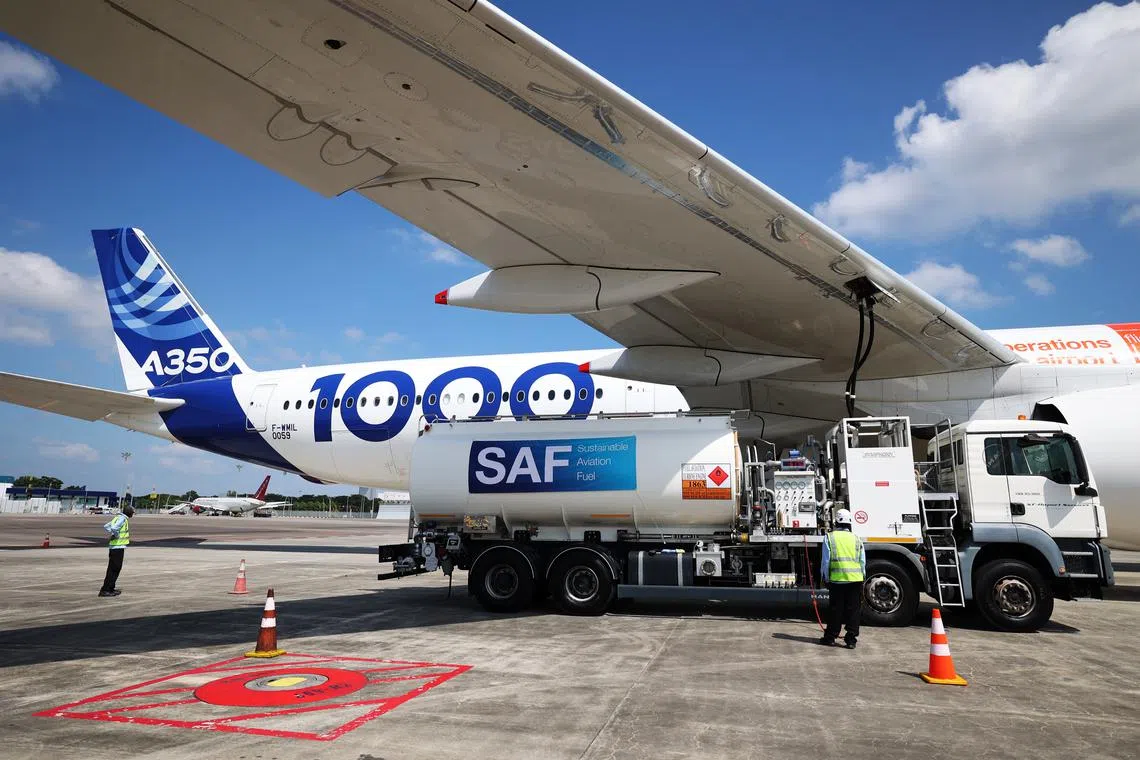Reducing carbon emissions in aviation by 5% by 2030 may not be achievable on global basis: Iata
Sign up now: Get ST's newsletters delivered to your inbox

The goal may not be achievable on a global basis due in part to the uneven production of sustainable aviation fuel, said Iata.
PHOTO: LIANHE ZAOBAO
DUBAI - The goal of reducing carbon emissions in international aviation by 5 per cent by 2030 may not be achievable on a global basis, due in part to the uneven production of sustainable aviation fuel (SAF), the International Air Transport Association (Iata) said at its annual meeting in Dubai.
Speaking to the media in a closing briefing on June 4, Iata director general Willie Walsh said: “I believe the 5 per cent (SAF) production goal by 2030 is extremely ambitious.
“When we look at the SAF that is in production and the SAF that can potentially be delivered between now and 2030, we have concerns that the 5 per cent target cannot be achieved on a global basis.
“We know that there’s no SAF production in Latin America. We see SAF production in certain parts of the world, and investments in SAF production in parts of the world, but not in Latin America.”
Mr Walsh added: “That’s where we need to be honest. If we have this figure of 5 per cent, and then in 2030, well ... in Latin America, it is only 1 per cent ... That’s why we have to have this debate, and we have to be honest. We are committed to achieving net-zero carbon emissions (in air transportation) by 2050. It will be difficult. We know it will be expensive, but we are determined to get there.”
The International Civil Aviation Organisation (ICAO) is aiming for net-zero emissions for aviation by 2050, and to reduce carbon emissions by 5 per cent by 2030
Stressing that Iata did not push for the 5 per cent target by 2030, Mr Walsh said: “What we are saying is we need to work together to get to the long-term goal of net-zero carbon emissions by 2050, and governments need to play their part. It is good they have this ambitious target. But they set the targets, so they have to be part of the solution.”
He said it is important to have this debate and get everybody – traditional fuel producers, renewable fuel producers, regulators, governments and industry – to have honest discussions.
“One of the criticisms levelled at our industry is that we set targets we couldn’t achieve, and we had set targets in the area of environment that we didn’t achieve, so I think that criticism is fair. We have learnt from that,” Mr Walsh added.
“So when we agreed to set net zero in 2050 as a target, we sat down to satisfy ourselves that we have a credible pathway to achieving net zero in 2050. We are not going to set artificial targets because we recognise that if we fail to meet them, we would be open to criticism.”
Asked what could be on the agenda for the next Iata AGM in Delhi in June 2025, India’s low-cost carrier IndiGo chief executive Pieter Elbers said that it will likely build on previously mentioned topics including “supply chains, sustainability, the availability of SAF, the trade-offs to be made and not made when it comes to (growing food crops to make aviation fuel), and the focus on safety now that the skies are getting busier”.
On the introduction of Singapore’s passenger levy for all departing flights from 2026
Singapore, which is part of ICAO, has set a target of 1 per cent SAF in the fuel of all departing flights in 2026, and plans to raise this to 3 per cent to 5 per cent by 2030, depending on SAF prices and availability. It is a measured approach that will be continually assessed by the Singapore Government based on market conditions.
“I’m instinctively against the idea of levies and taxes because I’m always suspicious that they’re not used for the intention to which they’ve been introduced. But I think in this case, I have more confidence that Singapore will do the right thing,” Mr Walsh said.
If the levy isn’t producing additional SAF, Singapore will look at a different option, he said. “They’re not just looking to extract tax revenues from airlines, they’re genuinely trying to stimulate the production of sustainable aviation fuel. And I think that is a positive.”
Mr Walsh added: “If I saw it introduced in the UK, I’d have very little confidence. But I have much more confidence that the Singapore Government will do the right thing. I’m not sure it would work as well elsewhere.”



